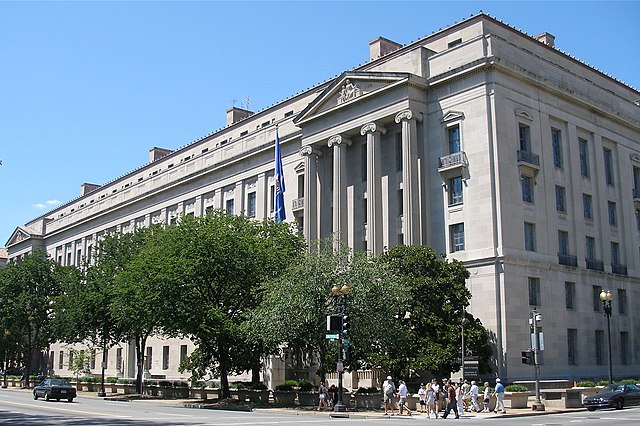DEPARTMENT OF JUSTICE IN THE NEWS
Mid-March Trends
This is the latest installment of a new biweekly blog series from RDP. Every two weeks, we call out ongoing trends in media coverage of the Justice Department’s focus and priorities, giving context from our past DOJ oversight work as needed, with an eye to the impact of DOJ capacity and resources, as well as alignment with the Biden administration’s professed goals.
- Google responds to DOJ’s antitrust actions via revolving door hiring.
As our Executive Director Jeff Hauser highlighted for CNBC last week, Google parent company Alphabet’s recent string of hiring former DOJ antitrust staffers has been a core response to the DOJ’s multiple ongoing suits against Google.
While this kind of response may be common for large corporations, particularly in the face of an enforcement push by antitrust chief Jonathan Kanter, it’s important not to let the commonality of corruption distract from its severity. The fact that large corporations routinely hire revolvers who have spent time in government does not make this dynamic less harmful to public trust in government, or to the government’s ability to fulfill its mandate to regulate corporations and curb harms to the public.
- Criminal legal reform delays: Biden DOJ still seeking death penalty in some cases, despite Biden’s campaign promises, and a test for DOJ commitment to addressing elite wrongdoing.
The Biden DOJ made news last week when it sought the death penalty in the case of Sayfullo Saipov, who was convicted of “committing a terrorist-inspired act” when, in 2017, he used a truck to run over and kill eight people in a New York City bike lane, citing support for ISIS as his motivation.
This case is one of six in which the Justice Department is still pursuing the death penalty, while Attorney General Merrick Garland has halted 25 other death penalty cases the DOJ began under previous presidents. It’s fair to say that the Biden DOJ’s review of death penalty policies is a marked improvement over the Trump administration’s rapid acceleration of federal executions at the tail end of his presidency. As Trump’s time in office ended, the federal government executed 13 people in six months, compared to a rate of 3 people in the prior 32 years, in an unspeakably cruel crusade.
However, this violent spree must not be the standard against which the Biden DOJ is judged in its use of the death penalty. For one thing, Biden campaigned on a commitment to literally “eliminate the death penalty” — his campaign website reads, “Biden will work to pass legislation to eliminate the death penalty at the federal level, and incentivize states to follow the federal government’s example. These individuals should instead serve life sentences without probation or parole.”
We can’t hold Biden solely accountable for failing to make Congress pass legislation meeting this description. We can, however, point out that as president, he has final prosecutorial discretion with respect to federal executions, and could push the DOJ to halt executions in perpetuity, allowing more time for legislative priorities like abolishing the death penalty to advance.
Instead, the White House has been silent as the DOJ has ended its moratorium on federal executions. Updating DOJ policies to merely “drill[] down on the circumstances surrounding…the most heinous crimes before making the final call,” as the Wall Street Journal described AG Garland’s new DOJ guidelines this week, is a far cry from the “elimination” of capital punishment. That definitive policy pledge was used by Biden to curry favor with voters demanding change in a criminal legal system that has severely disproportionately executed Black, brown, and poor people. Despite committing to prioritize civil rights and address racist “discrimination in…the criminal justice system” at his confirmation hearing, Garland seems committed to repurposing the death penalty, rather than abolishing it.
This commitment is particularly concerning because the death penalty is no longer popular with a majority of the US public. A 2019 Gallup poll found that 60 percent of Americans find life in prison to be a better penalty for murder than the death penalty. For Biden’s DOJ to continue to pursue the death penalty, even only in select cases, undermines Biden’s credibility with his supporters and reinforces the impression (addressed in previous installments of this series) that Biden’s DOJ is not serious about making meaningful reforms to this United States’ deeply racist and classist criminal legal system.
Meanwhile, as discussed in this week’s RDP newsletter, the DOJ and SEC are embarking on an investigation of the collapse of Silicon Valley Bank, “including looking into major sales of company stock by top executives in the days before the collapse.” This kind of investigation into elite misconduct should be a top priority for the DOJ, as we’ve continually argued. Yet it is all too rare; recent years have seen record-low level of prosecutions for corporate and white-collar crime. If the Biden administration has any intention of following through on campaign promises related to addressing inequities in the criminal legal system, cracking down on elite bad actors is crucial, alongside responding to advocates’ calls for eliminating the violence the criminal legal system disproportionately enacts on marginalized communities.
Image: “U.S. Department of Justice headquarters, August 12, 2006“ is licensed under the Creative Commons Attribution-Share Alike 3.0 Unported license.

